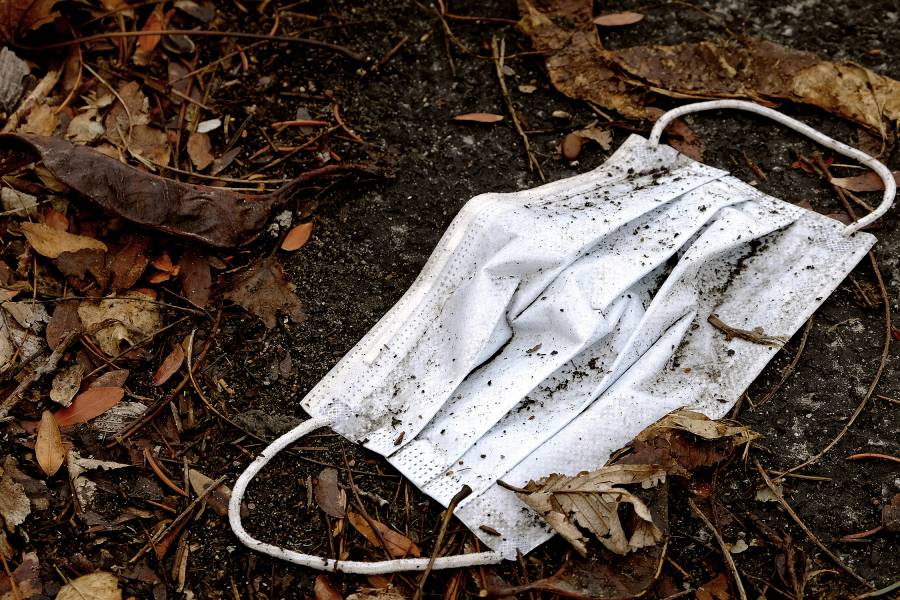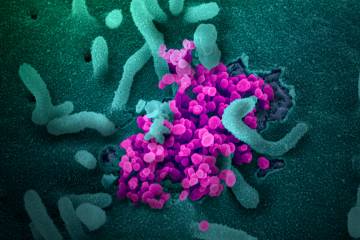We've all seen them: discarded gloves and masks littering parking lots and sidewalks.
Some of them make their way to rivers and oceans and wash up in remote, wild places. Invisibly, powerful disinfectants also end up in the water—and persist. The transformation from protection to pollution happens quickly, but the damage can last for centuries.
Ana María Rule, an assistant professor in Environmental Health and Engineering and an expert on aerosols and particulate matter, understands the protective powers of masks and advocates for their proper use. The Bloomberg School recently sat down with Rule for a conversation about the environmental impact of pandemic plastics, and she advocated for reducing their impact—by using fewer of them, replacing them with reusable options when possible, disposing of them properly, and developing environmentally friendly alternatives.
Obviously PPE has been critical for preventing the spread of COVID-19, but it does generate a lot of waste. What components do you see as the most damaging for the environment?
The U.S. and other industrialized countries have relatively good waste management systems. In contrast, trash in low-income countries often accumulates on the streets (which ends up washing to streams and rivers ending in the ocean), or is disposed of in illegal dumping sites (many times open-air), landfills, and open burning. Of course, even where there are good waste management systems, people have to make use of those systems and dispose of their masks properly—in trash bins—and that doesn't always happen. I have seen so many photos and videos of masks in rivers and oceans, and of course it's not sustainable.
Those blue surgical masks are somewhat degradable, but they have a plastic layer. Gloves are plastic. So these things are not going anywhere for many, many years. Over time they just become smaller and smaller particles—and these microplastics were a problem even before the pandemic. We're not yet sure what exactly the dangers are of micro and nano-sized plastics in the environment, but high concentrations have been found in fish, water, sediments, soils, and air. Organisms, including humans, are consuming them in food and water, and breathing them in. This is an active area of research to elucidate potential consequences for the environment and humans.
The improper disposal of single-use personal protective equipment has been a big concern for environmental people. So has the overuse of PPE. We don't need to wear gloves to go to the grocery store. It's more efficient to just wash your hands with soap and water.
Do you think it's possible to have single-use biodegradable or more environmentally friendly PPE?
I know there's a lot of research on this. From the beginning of the pandemic, people were thinking, maybe we can have masks that are a little simpler, with a filter you can change so that you dispose of a smaller piece, and maybe that filter can be more biodegradable. I have seen several groups around the country and the world working on this and other solutions.
What about waste from vaccinations? I assume syringes are incinerated.
Yes, because they're medical waste. Incineration is safer because the high temperature gets rid of whatever infectious agent is there. And incineration dramatically reduces the volume of waste. You might start with a room full of bags of waste and end up with a small amount of ash. Incineration is really good for those two reasons.
Unfortunately, incineration is also polluting, emitting heavy metals, particulate matter, and gases. There are technologies to reduce certain emissions from incineration, and those technologies are getting better, but are unable to reduce all emissions. We should invest in those technologies because it's an important way to reduce environmental impacts and human health effects.
Is there anything else we should be doing differently, for the environment's sake, in the pandemic response?
I talked earlier about gloves. The main route of exposure to respiratory viruses is air, not surfaces. The chain of events that need to happen from touching a surface that's infected to getting infected is much longer and easily breakable by just washing your hands. So stop using gloves, and use reusable cloth masks whenever possible.
There is also another waste stream I've been worried about: surface cleaners. Again, surfaces are not the main route of exposure.
Also see
The EPA has a list of approved cleaners shown to kill or to inactivate the coronavirus—but just because they were approved to disinfect surfaces doesn't mean they've been proven safe for humans to touch and breathe. Yet we're using more and more of them. We're regularly using some that were meant for occasional use. They end up in the water, and even the best water treatment plants are not designed to get rid of high concentrations of these chemicals.
I've been concerned for a while that we're overusing powerful chemical disinfectants called quaternary ammonium compounds (or "quats" or "QACs"), which can take many years to degrade and that accumulate in the environment.
This immediately makes me think about schools. They're trying to safely reopen, but that seems to involve a lot of extra cleaning and disinfecting.
I've been trying to communicate [the potential risks] to whoever will listen. Some schools and workplaces have used these fogging systems. The disinfectants are aerosolized, so they are getting not only onto surfaces but into the air. The right way to do it is to spray it and leave the room, and let it completely air out. But not everybody is trained, not everybody follows label instructions, and not everybody is aware of the dangers of overusing these chemicals. They think that doing this makes places more safe, but we don't know the long-term effects.
What has happened with other chemicals, unfortunately, is that we have extended use of them, and then the research catches up. Little by little, we're going to start finding out what these consequences are.
This article originally appeared on the Expert Insights blog of the Bloomberg School of Public Health.
Posted in Health, Science+Technology, Voices+Opinion
Tagged environmental engineering, environmental health, coronavirus, covid-19










